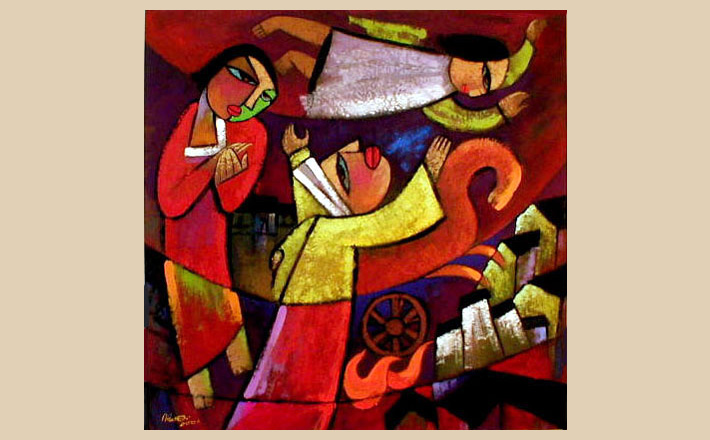Commentary on 2 Kings 2:1-2, 6-14
Prophecy is all about relationships and the expressions of loyalty.
Verse one set the context for the statement of relationships and obligations as the impending transitions. The language of whirlwind (se’ara) can be associated with theophany (Job 38:1; 40:6) but also divine punishment (Jeremiah 23:19, Zechariah 9:14; Psalm 83:16). Here we see both God’s powerful and amorphous presence. The use of the storm makes sense in the ancient world where Phoenician, Syrian, and Mesopotamian storm gods such as Baal or Hadad dominate the theological imagination.
Four characters appear in the first verses of 2 Kings 2: God, Elijah, Elisha, and the prophetic guild. Only the last three have speaking parts. Elijah instructs Elisha “stay here.” Elisha rejects Elijah’s admonition. Elisha pledges that he will not forsake his mentor. The prophetic guild makes the speech to explain the instructions of Elijah to Elisha with the phrase “don’t you know?” (2 Kings 2:3a). Then Elisha rebuts the prophetic guild as well. Elisha let them know that he in fact knew what was about to happen. Elisha instructed the prophetic guild to keep silent (2 Kings 2:3b). The cycle of speeches occurs three times with the itinerary Bethel, Jericho, and finally the Jordan. The conversation between Naomi and Ruth might provide an interesting parallel (See Ruth 1:7-18).
The passage locates Elijah and Elisha at Gilgal, which connects to the Joshua tradition (See chapters 2-5) as the initial encampment. They travel on to Bethel and Jericho. These parallels may reflect the authors attempt to portray Elijah and Elisha as the new Moses and Joshua (Numbers 27:12-23; Deuteronomy 31-34).
The mantel that figured so prominently in 1 Kings 19 makes another appearance. Elijah strikes the Jordan River and the waters are divided and they walked on dryland. The same trope occurs in Exodus 14:21; Joshua 3:17, 4:18. Each of the previous uses mark a group building crossing of water either the Sea of Reeds (Exodus 14) or the Jordan (Joshua 3:17, 4:18). They mark a transition in community identity.
The mentor prophet Elijah asks his protégé what he would like to receive. The protégé seems to surprise Elijah when he responds that he wants twice Elijah’s spirit. The senior prophet Elijah questions the wisdom of Elisha’s request. In some ways this anticipates the request of John and James to sit at the right and left hand of Jesus (Mark 10:37; Matthew 20:23). The theme of loyalty comes up in verse ten. If Elisha stays close enough to Elijah to be able to see him at the point of his taking up, then Elisha would receive the double portion of spirit.
Is the “double portion” literally “double mouth”? The eldest son receives a double portion (Deuteronomy 21:17). The term occurs in Zechariah 13:8 where it refers to two thirds instead of double. The use of double portion in familial context might indicate that the prophetic guild took on some of the language of the paterfamilias of the extended family that acquired to describe itself. Another strategy frames the double portion as twice the prophet that Elijah was. Such a strategy reminds the reader of the Elijah brave prophet on Mount Carmel (1 Kings 18) and the dejected prophet hiding in the wilderness in the south who laments, “I alone have been zealous for the LORD.”
Elisha pledged not to abandon Elijah but in the end Elisha could not prevent a separation. Amidst their journey God breaks in the form of the chariot of fire and horses of fire. Elisha’s response is both recognition and grieving. The language of the family intrudes into the relationship between prophet and protégé. The protégé Elisha laments “my father, my father.” This use of “father” language to refer to a group’s leader (2 Kings 2:12, 13-14; 1 Samuel 10:12 and maybe 2 Kings 6:21), indicates an appropriation of familial obligation in the prophetic guild.
Weather deities such as Baal and Hadad are depicted in the iconography of the Mediterranean world as riding in chariots or winged sun disks. God is characterized as riding through the heavens on a chariot elsewhere in the Hebrew Bible. (See Psalm 68:5, 34; Psalm 18:11; 2 Samuel 22:11; Deuteronomy 33:26; Isaiah 19:1, and most notably Ezekiel 1:8-11). The chariots of fire are now named as the chariots of Israel. God has made it impossible for Elisha to keep his pledge to not be separated from Elijah. Now a solitary Elisha returns to the bank of the Jordan River. He stands on the bank where he and Elijah had stood before.
In the original Star Wars movie when Obi Wan Kenobi was supposedly “struck down” all that remained was his cloak. The remaining heroes fled and left the cloak behind but not so Elisha. This mantel was a sign of prophetic authority and a tool for prophetic acts of power. Elisha picks up the mantel of Elijah (2 Kings 2:13) and took it. He then struck the Jordan River and is split. This is a literary conclusion of the event that began earlier in chapter 2. When Elisha strikes the water with the mantel he invokes the name of Elijah in an odd way. He begins with a question “where is the God of Elijah?” With this invocation he strikes the waters of the Jordan and it splits as it had when Elijah did the same (2 Kings 2:9) and Elisha passed over. What was implicit with the first crossing of the Jordan by the pair Elijah and Elisha, namely the reference to Exodus and Joshua, now is explicitly connected to the tradition of Elijah.
The transition of prophetic power began in 1 Kings 19 with the call of Elisha. The mantel started Elisha’s ministry. Elijah used the mantel to part the waters in an oblique allusion to the crossing of the Reed Sea (Exodus 14) and the crossing of the Jordan (Joshua 3 and 4) Now the protégé performs the act of power that his mentor accomplished. Now the transition is complete?


June 26, 2016